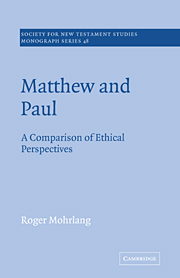Summary
For religious Jews in the early Christian era, the Mosaic law was the authoritative expression of God's will and absolutely central to all of life. As such, it functioned both as the basis of ethical obligation and as the definitive proclamation of what constituted morally upright behaviour. Ethical living was accordingly understood largely in terms of compliance with the law. As in any moral system based on legal considerations, authority, obedience and judgement were key concepts in the overall structure, and heavily coloured the Jewish view of life.
In view of the fact that both Matthew and Paul appear to reflect Jewish backgrounds, it is appropriate to begin our study by investigating the extent to which traditional legal concepts have shaped their ethics. To what extent do the two writers view the Christian life within the framework of the law, and to what degree do they think of ethical behaviour as motivated by a sense of ‘law'? How has their understanding of Christ modified their conception of the law and its role in the Christian's life? As this whole question is of fundamental importance for our understanding of their moral perspectives, especial attention will be devoted to it.
Matthew
The importance in Matthew's thinking of the whole question of the law and its place in the Christian community is clear from the prominent place he gives to Jesus' discussion of the issue in 5.17–48.
- Type
- Chapter
- Information
- Matthew and PaulA Comparison of Ethical Perspectives, pp. 7 - 47Publisher: Cambridge University PressPrint publication year: 1984
- 1
- Cited by

